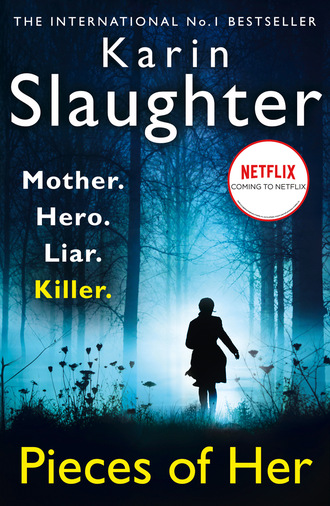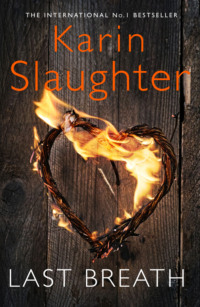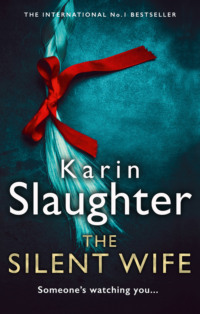“Promise me,” Laura had insisted. “Don’t talk to the police.”
Four hours later, Andy still hadn’t talked to the police, but that was more because the police had not talked to her. Not at the diner, not in the ambulance and not now.
Andy was waiting outside the closed doors to the surgical suite while the doctors operated on Laura. She was slumped in a hard plastic chair. She had refused to lie down, refused to take the nurse up on the offer of a bed, because nothing was wrong with her. Laura needed the help. And Shelly. And Shelly’s mother, whose name Andy could not now remember.
Who was Mrs. Barnard, really, if not a mother to her child?
Andy sat back in the chair. She had to turn a certain way to keep the bruise on her head from throbbing. The plate glass window overlooking the boardwalk. Andy remembered her mother tackling her to the ground. The pounding at the back of her head as her skull cracked against the window. The spiderwebbing glass. The way Laura quickly scrambled to stand. The way she had looked and sounded so calm.
The way she had held up her fingers—four on the left hand, one on the right—as she explained to the shooter that he only had one bullet left out of the six he had started with.
Andy rubbed her face with her hands. She did not look at the clock, because looking up at the clock every time she wanted to would make the hours stretch out interminably. She ran her tongue along her fillings. The metal ones had been drilled out and replaced with composite, but she could still remember how The Sound had made them almost vibrate inside her molars. Into her jaw. Up into her skull. A vise-like noise that made her brain feel as if it was going to implode.
Eeeeeeeeeeee …
Andy squeezed her eyes shut. Immediately, the images started scrolling like one of Gordon’s vacation slide shows.
Laura holding up her hand.
The long blade slicing into her palm.
Wrenching the knife away.
Backhanding the blade into the man’s neck.
Blood.
So much blood.
Jonah Helsinger. That was the murderer’s name. Andy knew it—she wasn’t sure how. Was it on the dispatch radio when she rode in the ambulance with her mother? Was it on the news blaring from the TV when Andy was led into the triage waiting room? Was it on the nurses’ lips as they led her up to the surgical wing?
“Jonah Helsinger,” someone had whispered, the way you’d whisper that someone had cancer. “The killer’s name is Jonah Helsinger.”
“Ma’am?” A Savannah police officer was standing in front of Andy.
“I don’t—” Andy tried to recall what her mother had told her to say. “I can’t remember.”
“Ma’am,” the officer repeated, which was weird because she was older than Andy. “I’m sorry to bother you, but there’s a man. He says he’s your father, but—”
Andy looked up the hall.
Gordon was standing by the elevators.
She was up and running before she could think about it. Gordon met her halfway, grabbing her in a bear hug, holding her so close that she could feel his heart pounding in his chest. She pressed her face into his starched white shirt. He had been at work, dressed in his usual three-piece suit. His reading glasses were still on top of his head. His Montblanc pen was tucked into his shirt pocket. The metal was cold against the tip of her ear.
Andy had been losing her shit in little pieces since the shooting began, but in her father’s arms, finally safe, she completely lost it. She started to cry so hard that she couldn’t support her own weight. Gordon half lifted, half dragged her to a set of chairs against the wall. He held onto her so tightly that she had to take shallow breaths to breathe.
“I’m here,” he told her, again and again. “I’m here, baby. I’m here.”
“Daddy,” she said, the word coming out around a sob.
“It’s okay.” Gordon stroked back her hair. “You’re safe now. Everybody’s safe.”
Andy kept crying. She cried so long that she began to feel self-conscious, like it was too much. Laura was alive. Bad things had happened, but Laura was going to be okay. Andy was going to be okay. She had to be okay.
“It’s okay,” Gordon murmured. “Just let it all out.”
Andy sniffed back her tears. She tried to regain her composure. And tried. Every time she thought she might be all right, she remembered another detail—the sound of the first gunshot, like a jar popping open, the thwack as her mother lodged the knife into flesh and bone—and the tears started to fall again.
“It’s all right,” Gordon said, patiently stroking her head. “Everybody’s okay, sweetheart.”
Andy wiped her nose. She took a shaky breath. Gordon leaned up in the chair, still holding onto her, and pulled out his handkerchief.
Andy blotted away her tears, blew her nose. “I’m sorry.”
“You have nothing to apologize for.” Gordon pushed her hair back out of her eyes. “Were you hurt?”
She shook her head. Blew her nose again until her ears popped.
The Sound was gone.
She closed her eyes, relief taking hold.
“All right?” Gordon asked. His hand was warm against her back. She felt anchored again. “You okay?”
Andy opened her eyes. Her nerves still felt raw, but she had to tell her father what had happened. “Mom—she had a knife, and this guy, she mur—”
“Shhh,” he hushed, pressing his fingers to her lips. “Mom’s okay. We’re all okay.”
“But—”
He put his finger back to her lips to keep her quiet. “I talked to the doctor. Mom’s in recovery. Her hand is going to be fine. Her leg is fine. It’s all fine.” He raised an eyebrow, tilted his head slightly to the right where the cop was standing. The woman was on the phone, but she was clearly listening.
Gordon asked Andy, “You sure you’re okay? Did they check you out?”
She nodded.
“You’re just tired, baby. You were up all night working. You saw something horrible happen. Your life was in danger. Your mother’s life was in danger. It’s understandable you’re in shock. You need some rest, give your memories some time to piece themselves together.” His tone was measured. Andy realized that Gordon was coaching her. “All right?”
She nodded because he was nodding. Why was he telling her what to say? Had he talked to Laura? Was her mother in trouble?
She had killed a man. Of course she was in trouble.
The police officer said, “Ma’am, do you mind giving me some basic information? Full name, address, birthdate, that kind of thing.”
“I’ll provide that, Officer.” Gordon waited for the woman to pull out her pen and notebook before he complied.
Andy tucked herself back underneath his protective arm. She swallowed so hard that her throat clicked.
And then she made herself look at the situation as a human being out in the world rather than a terrified spectator.
This wasn’t one drug dealer shooting another drug dealer in the streets, or an abusive spouse finally crossing the last line. A white kid had shot two white women, then was killed by another white woman, in one of the most affluent malls in the state.
News trucks would probably come down from Atlanta and Charleston. Lawyers would intervene for the families, the victims, the mall management, the city, the county, maybe even the feds. An array of police forces would descend: Belle Isle, Savannah, Chatham County, the Georgia Bureau of Investigation. Witness statements. Forensics. Photographs. Autopsies. Evidence collection.
Part of Andy’s job in radio dispatch was to assign case numbers for crimes on a far smaller scale, and she often tracked their progress over the months, sometimes years, it took for a case to go to trial. She of all people should have known that her mother’s actions would be scrutinized at every single level of the criminal justice system.
As if on cue, there was a loud ding from the elevator. The cop’s leather gunbelt made a squeaking noise as she adjusted it on her hips. The doors slid open. A man and a woman walked into the hallway. Both in wrinkled suits. Both with tired looks on their faces. The guy was bald and bloated with patches of peeling sunburn on his nose. The woman was around Andy’s height, at least ten years older, with olive skin and dark hair.
Andy started to stand, but Gordon kept her in the chair.
“Ms. Oliver.” The woman took out her badge and showed it to Andy. “I’m Detective Sergeant Lisa Palazzolo. This is Detective Brant Wilkes. We’re with the Savannah Police Department. We’re assisting Belle Isle with the investigation.” She tucked her badge back into her jacket pocket. “We need to talk to you about what happened this morning.”
Andy’s mouth opened, but again, she couldn’t remember what her mother had told her to say, or what Gordon had coached her to say, so she reverted to her default response which was to close her mouth and stare blankly at the person who had asked the question.
Gordon said, “This isn’t a good time, Detectives. My daughter is in shock. She’s not yet ready to give her statement.”
Wilkes huffed a disapproving grunt. “You’re her father?”
Andy always forgot Gordon was black and she was white until someone else pointed it out to her.
“Yes, Detective. I’m her father.” Gordon’s tone was patient. He was used to this. Over the years, he’d smoothed the nerves of anxious teachers, concerned store clerks, and aggressively racist store security. “I’m Gordon Oliver, Laura’s ex-husband. Andrea’s adoptive father.”
Wilkes twisted his mouth to the side as he silently scrutinized the story.
Palazzolo said, “We’re real sorry about what happened, Mr. Oliver, but we need to ask Andrea some questions.”
Gordon repeated, “As I said, she isn’t prepared at the moment to discuss the incident.” He crossed his legs, casual, as if this was all a formality. “Andrea is a dispatch operator, which I’m sure you can tell from her uniform. She worked a night shift. She’s bone-tired. She witnessed a terrible tragedy. She’s not in any shape to give a statement.”
“It was a terrible tragedy,” Palazzolo agreed. “Three people are dead.”
“And my daughter could’ve been the fourth.” Gordon kept a protective arm around Andy’s shoulders. “We’d be happy to make an appointment to come to the station tomorrow.”
“This is an active murder investigation.”
“The suspect is dead,” Gordon reminded her. “There’s no clock on this, Detective. One more day won’t make a difference.”
Wilkes grunted again. “How old are you?”
Andy realized he was talking to her.
Gordon said, “She’s thirty-one. Her birthday is today.”
Andy suddenly remembered Gordon’s voicemail this morning, an off-key version of “Happy Birthday” in his deep baritone.
Wilkes said, “She’s a little old to let her daddy talk for her.”
Palazzolo rolled her eyes, but said, “Ms. Oliver, we’d really like it if you helped us get the chain of events down on paper. You’re the only witness who hasn’t given a statement.”
Andy knew that wasn’t true, because Laura was still coming round from the anesthesia.
Gordon said, “Detectives, if—”
“You her daddy or her fucking lawyer?” Wilkes demanded. “Because we can remove you from—”
Gordon stood up. He was at least a foot taller than Wilkes. “I happen to be a lawyer, Mr. Wilkes, and I can either school you on my daughter’s constitutional right to refuse this interrogation or I can file a formal complaint with your superiors.”
Andy could see the man’s eyes shifting back and forth, his mouth itching to put Gordon in his place.
Palazzolo said, “Brant, take a walk.”
Wilkes didn’t move.
“Brant, come on. Meet me in the cafeteria. Get something to eat.”
Wilkes glared at Gordon like an unneutered pitbull before stomping away.
Palazzolo said, “Mr. Oliver, I understand your daughter’s been through a lot today, but even though Savannah’s not what you’d call a sleepy town, we’re unaccustomed to triple homicides. We really need to get your daughter’s statement down. We need to know what happened.”
Gordon corrected, “Double homicide.”
“Right.” There was a moment of hesitation before Palazzolo spoke again. “Can we do this sitting down?” She offered Andy a conciliatory smile. “I work the night shift, too. I’ve been up eighteen hours straight with no end in sight.” She was dragging over a chair before Gordon could stop her. “Look, I’ll tell you what I know, and then if Andrea feels like it, she can tell me what she knows. Or not. Either way, you get to see our side of this thing.” She indicated the other chairs. “That’s a good deal, Mr. Oliver. I hope you’ll consider taking it.”
Andy looked up at her father. Triple homicide? Two people wounded? Why did it feel like the detective was not counting Laura among the injured?
“Mr. Oliver?” Palazzolo tapped the back of her chair, but didn’t sit. “What about it?”
Gordon looked down at Andy.
She had seen that look a thousand times before: Remember what I told you.
Andy nodded. She was, if anything, extraordinarily good at keeping her mouth shut.
“Great.” Palazzolo sat down with a sharp groan.
Gordon nudged Andy down so that he would be the one who was directly across from Palazzolo.
“Okay.” Palazzolo took out her notebook, but not her pen. She flipped through the pages. “The shooter’s name is Jonah Lee Helsinger. Eighteen years old. High school senior. Early acceptance into Florida State University. The young girl was Shelly Anne Barnard. She was at the diner with her mother, Elizabeth Leona Bernard; Betsy. Jonah Lee Helsinger is—was—the ex-boyfriend of Shelly. Her father says Shelly broke up with Helsinger two weeks ago. Wanted to do it before going to college next month. Helsinger didn’t take it well.”
Gordon cleared his throat. “That’s quite an understatement.”
She nodded, ignoring the sarcasm. “Unfortunately, law enforcement has had a lot of these cases to study over the years. We know that spree killings aren’t usually spur of the moment. They’re well-planned, well-executed operations that tend to get worked over in the back of the killer’s mind until something—an event like a break-up or an impending life change like going off to college—jumpstarts the plan. The first victim is generally a close female, which is why we were relieved to find Helsinger’s mother was out of town this morning. Business in Charleston. But the way Helsinger was dressed—the black hat, the vest and gunbelt he bought on Amazon six months ago—all that tells us that he put a lot of thought into how this was going to go down. The spark came when Shelly broke up with him, but the idea of it, the planning, was in his head for months.”
Spree killings.
The two words bounced around inside Andy’s head.
Gordon asked, “His victims were all women?”
“There was a man sitting in the restaurant. He was struck in the eye by shrapnel. Not sure if he’ll lose it or not. The eye.” She went back to Jonah Helsinger. “What we also know about spree killers is, they tend to plant explosive devices in their homes for maximum casualties. That’s why we got the state bomb squad to clear Helsinger’s bedroom before we went in. He had a pipe bomb wired to the doorknob. Faulty set-up. Probably got it off the internet. Nothing went boom, thank God.”
Andy opened her mouth so she could breathe. She had come face-to-face with this guy. He had almost killed Laura. Almost killed Andy. Murdered people. Tried to blow them up.
He had probably attended Belle Isle High School, the same as Andy.
“Helsinger,” Gordon said. “That name sounds familiar.”
“Yeah, the family’s pretty well known up in Bibb County. Anyway—”
“Well known,” Gordon repeated, but the two words were weighted in a way that Andy could not decipher.
Palazzolo obviously got their meaning. She held Gordon’s gaze for a moment before she continued, “Anyway—Jonah Helsinger left some school notebooks on his bed. Most of them were filled with drawings. Disturbing images, weird stuff. He had four more handguns, an AR-15 and a shotgun, so he chose to take the six-shooter and the knife for a reason. We think we know the reason. There was a file on his laptop called ‘Death Plan’ that contained two documents and a PDF.”
Andy felt a shudder work its way through her body. While she was getting ready for work last night, Jonah Helsinger was probably lying in bed, psyching himself up for his killing spree.
Palazzolo continued, “The PDF was a schematic of the diner, sort of like what you’d see an architect draw. One of the docs was a timeline, like a bullet point: wake up at this time, shower at this time, clean gun here, fill up car with gas there. The other doc was sort of like a diary entry where Helsinger wrote about how and why this was going to go down.” She referred to her notebook again. “His first targets were going to be Shelly and her mother. Apparently, they had a standing lunch date every Monday at the Rise-n-Dine. Shelly wrote about it on Facebook, Snapchatted her food or whatever. Mr. Barnard told us the lunches are something his wife and daughter decided to do together over the summer before college.”
“Were something they decided to do,” Gordon mumbled, because everything in the two women’s lives was past tense now.
“Were. Yeah,” Palazzolo said. “Helsinger planned to kill both of them. He blamed the mother for the break-up. He said in his diary that it was Betsy’s fault, that she was always pushing Shelly, blah blah blah. Crazy talk. It doesn’t matter, because we all know it’s Jonah Helsinger’s fault, right?”
“Right,” Gordon said, his voice firm.
Palazzolo held his gaze in that meaningful way again before she referred back to her notes. “This was his plan: after he killed Betsy and Shelly, Helsinger was going to take hostage whoever was left in the diner. He had a time noted—1:16, not the actual time but a notation of timing.” She looked up at Andy, then Gordon. “See, we think that he did a dry run. Last week, at approximately the same time as the shooting today, somebody threw a rock through the plate glass window that faces the boardwalk. We’re waiting for the security feed. The incident was filed with burglary division. It took the first mall cop about one minute, sixteen seconds, to get to the diner.”
The mall cops weren’t the usual rent-a-cops, but off-duty police officers hired to protect the high-end stores. Andy had seen the guns on their hips and never given it a second thought.
Palazzolo told them, “In Helsinger’s predicted timeline of the shooting, he allowed that he would have to kill at least one other bystander to let the cops know that he was serious. Then he was going to let the cops kill him. Helsinger must have thought his plan was fast-forwarded when he saw your uniform and assumed that you were law enforcement.” Palazzolo was talking directly to Andy now. “We gather from the other witnesses that he wanted you to shoot him. Suicide by cop.”
Except Andy was not a cop.
Get up! Do your job!
That’s what Helsinger had screamed at Andy.
Then Andy’s mother had said, “Shoot me.”
“He’s a really bad guy. Was a bad guy. This Helsinger kid.” Palazzolo was still focused on Andy. “We’ve got it all in his notes. He planned this out meticulously. He knew he was going to murder people. He hoped that he would murder even more people when somebody opened his bedroom door. He packed screws and nails into that pipe bomb. If the wiring hadn’t been switched on the doorknob end, the whole house would be gone, along with whoever happened to be inside. We would’ve found nails two blocks away buried in God knows who or what.”
Andy wanted to nod but she felt immobilized. Screws and nails flying through the air. What did it take to build such a device, to pack in all those projectiles in hopes that they would maim or kill people?
“You’re lucky,” Palazzolo told Andy. “If your mom hadn’t been there, he would’ve killed you. He was just a really bad guy.”
Andy felt the woman looking at her, but she kept her eyes directed toward the floor.
Bad guy.
Palazzolo kept repeating the phrase, like it was okay that Helsinger was dead. Like he had gotten what he deserved. Like whatever Laura had done was completely justified because Jonah Lee Helsinger was a bad guy.
Andy worked at a police station. Most of the people who got murdered would fall into the bad guy category, yet she had never heard any of the detectives harp on the fact that the victim was a bad guy.
“Mr. Oliver,” Palazzolo had turned to Gordon. “Has your wife had any military training?”
Gordon did not answer.
Palazzolo said, “Her background is pretty bland.” Again, she flipped through the pages in her notebook. “Born in Providence, Rhode Island. Attended the University of Rhode Island. Master’s and PhD from UGA. She’s lived in Belle Isle for twenty-eight years. House is paid off, which, congratulations. She could sell it for a bag of money—but, I get it, where would she go? One marriage, one divorce. No large outstanding debts. Pays her bills on time. Never left the country. Got a parking ticket three years ago that she paid online. She must’ve been one of the first people to buy here.” Palazzolo turned back toward Andy. “You were raised here, right?”
Andy stared at the woman. She had a mole near her ear, just under her jawline.
“You went to school on the Isle, then SCAD for college?”
Andy had spent the first two years of her life in Athens while Laura was finishing her doctorate, but the only thing she remembered about UGA was being scared of the neighbor’s parakeet.
“Ms. Oliver.” Palazzolo’s voice sounded strained. She was apparently used to having her questions answered. “Did your mother ever take any self-defense classes?”
Andy studied the mole. There were some short hairs sticking out of it.
“Yoga? Pilates? Tai chi?” Palazzolo waited. And waited. Then she closed her notebook. She put it back into her pocket. She reached into her other pocket. She pulled out her phone. She tapped at the screen. “I’m showing you this because it’s already on the news.” She swiped at the screen. “One of the patrons in the diner decided that it was more important to record what was happening on his cell phone than to call 911 or run for his life.”
She turned the phone around. The image was paused. Jonah Helsinger stood at the entrance to the restaurant. The lower half of his body was obscured by a trash can. The mall was empty behind him. From the angle, Andy knew the waitress standing in the back had not taken the video. She wondered if it was the man with the newspaper. The phone had been tilted just over the salt and pepper shakers, like he was trying to hide the fact that he was recording the weird kid who was dressed like the villain from a John Wayne movie.
Objectively, the hat was ridiculous; too large for Helsinger’s head, stiff on the top and curled up almost comically.
Andy might have filmed him, too.
Palazzolo said, “This is pretty graphic. They’re blurring the images on the news. Are you okay to see this?” She was talking to Gordon because, obviously, Andy had already seen it.
Gordon smoothed down his mustache with his finger and thumb as he considered the question. Andy knew he could handle it. He was asking himself if he really wanted to see it.
He finally decided. “Yes.”
Palazzolo snaked her finger around the edge of the phone and tapped the screen.
At first, Andy wondered if the touch had registered because Jonah Helsinger was not moving. For several seconds, he just stood there behind the trash can, staring blankly into the restaurant, his ten-gallon hat high on his shiny-looking forehead.
Two older women, mall walkers, strutted behind him. One of them clocked the western attire, elbowed the other, and they both laughed.
Muzak played in the background. Madonna’s ‘Dress You Up’.
Someone coughed. The tinny sound vibrated into Andy’s ears, and she wondered if she had registered any of these noises when they happened, when she was in the restaurant telling the waitress she was a theater major, when she was staring out the window at the waves cresting in the distance.








